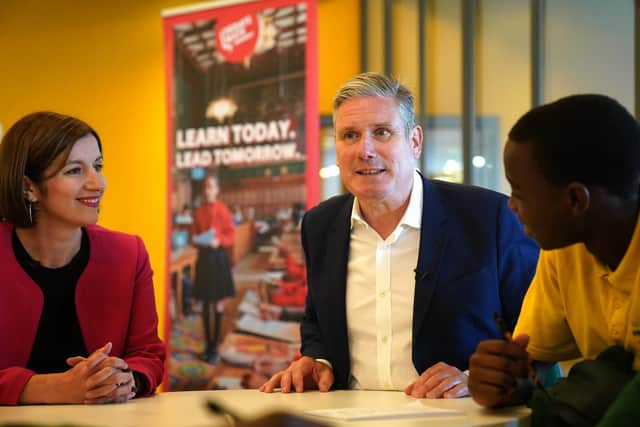‘We’ll Get Back To You On That’ seems to be the only slogan Sir Keir Starmer has - David Behrens
That being the case, the party’s eternally hopeful membership will gather in a medium-size conference centre in Bournemouth today to agonise over whether to throw their lot in with Labour in the hung parliament that next year’s election will almost certainly produce.
The last time anything like this happened was in 2010 when Nick Clegg propped up David Cameron’s Conservatives and flip-flopped on university fees so unashamedly that he was flipped right out of Westminster at the earliest opportunity.
Advertisement
Hide AdAdvertisement
Hide AdBut for a better foretaste of what is likely to come, you have to go back to 1977 when David Steel went into business with Jim Callaghan’s minority Labour government and also came out empty-handed.


The ink was barely dry on his predecessor Jeremy Thorpe’s arrest warrant when Steel pitched up at the Brighton Pavilion that September. “History will have to judge where the balance of party advantage lies,” he told the delegates, suddenly awake to the realisation that they were now inside the tent looking out, rather than the other way around.
Many were sceptical of this Lib-Lab pact of his, the first official bi-party agreement since the war. Even Steel wasn’t sure what the Liberals would gain from it.
I covered that conference, holed up on expenses in one of those seaside B&Bs that made Fawlty Towers look like the New York Hilton and I recall the Rochdale MP Cyril Smith – an instantly dislikeable character long before his sordid private life became public – throwing his considerable weight behind overturning the arrangement. He was anti-coalition, he said, “unless you have enough MPs to guarantee your identity within the coalition”. The Liberals had just 13 including Thorpe.
Advertisement
Hide AdAdvertisement
Hide AdSo it was a futile exercise. The pact was annulled a year later and Callaghan was gone eight months after that. Yet by this time next year history is likely to have repeated itself.
Why so? It’s because in Britain we don’t know what we want so we can’t vote for it. We only vote against what we don’t want. It’s a negative way of instilling change but no better than our negative politicians deserve.
The consensus at the moment is that we don’t want a full term of Rishi Sunak – but we don’t know what Keir Starmer would give us instead.
Worse still, his own party doesn’t know. Last week, Tracy Brabin, the elected Labour mayor of West Yorkshire, was forced to press him for a commitment to build a mass transit system in Leeds – the sort of tram network other Northern cities take for granted. The fact that the negotiation took place in public rather than in Starmer’s office demonstrates how far the party still is from showing a united front.
Advertisement
Hide AdAdvertisement
Hide AdPoliticians win large majorities only by presenting simple messages that work like kryptonite by depriving disengaged voters of their powers of rational thought. Get Brexit Done. New Labour, New Britain. Labour Isn’t Working. Those were the slogans that won elections. The only message we’re getting from Starmer right now is We’ll Get Back To You On That. It’s a signpost to stalemate and an outstretched arm to David Steel’s successor.
Within the constituencies it’s even worse. Seven councillors in Sheffield have been suspended for defying the party whip and there are cases across the North of left-wingers being sidelined by a central office determined to draw a line under the recent past. So if Labour itself doesn’t know what it stands for, even after three years under Starmer, how can the rest of us possibly judge?
Rishi Sunak is trying to exploit the disunity by disowning unpopular and impractical policies on banning petrol cars and gas boilers. But in the process he’s exposing splits in his own ranks, with his former environment minister Zac Goldsmith claiming the action will damage the UK’s “credibility” on climate issues. As if anyone really thought we sounded credible on anything.
The latest opinion polls underline the universal negativity: The PM’s net satisfaction score has hit a record low of minus 44, matching Boris Johnson’s rating before he left office. Yet the support has not been transferred to anyone else. The number of voters who think Labour is ready for office has actually gone down since July, to just 38 per cent.
Advertisement
Hide AdAdvertisement
Hide AdSo it is to the politics of 1977 that we must return. It was a time when half the country was on strike, inflation had hit 15 per cent and a 16-year-old Yorkshire Conservative called William Hague told his own party conference, in that strangulated voice of his, that “most of you won’t be here in 30 or 40 years time”. I’m very much afraid we still are.